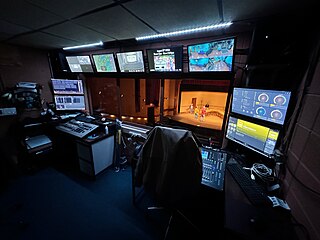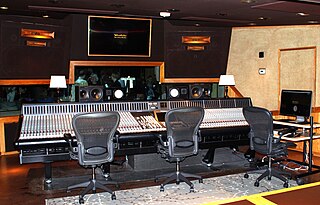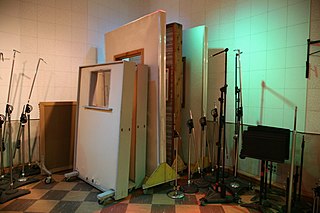
A record producer or music producer is a music creating project's overall supervisor whose responsibilities can involve a range of creative and technical leadership roles. Typically the job involves hands-on oversight of recording sessions; ensuring artists deliver acceptable and quality performances, supervising the technical engineering of the recording, and coordinating the production team and process. The producer's involvement in a musical project can vary in depth and scope. Sometimes in popular genres the producer may create the recording's entire sound and structure. However, in classical music recording, for example, the producer serves as more of a liaison between the conductor and the engineering team. The role is often likened to that of a film director though there are important differences. It is distinct from the role of an executive producer, who is mostly involved in the recording project on an administrative level, and from the audio engineer who operates the recording technology.

Audio mixing is the process by which multiple sounds are combined into one or more audio channels. In the process, a source's volume level, frequency content, dynamics, and panoramic position are manipulated or enhanced. This practical, aesthetic, or otherwise creative treatment is done in order to produce a finished version that is appealing to listeners.

A mixing console or mixing desk is an electronic device for mixing audio signals, used in sound recording and reproduction and sound reinforcement systems. Inputs to the console include microphones, signals from electric or electronic instruments, or recorded sounds. Mixers may control analog or digital signals. The modified signals are summed to produce the combined output signals, which can then be broadcast, amplified through a sound reinforcement system or recorded.

A recording studio is a specialized facility for recording and mixing of instrumental or vocal musical performances, spoken words, and other sounds. They range in size from a small in-home project studio large enough to record a single singer-guitarist, to a large building with space for a full orchestra of 100 or more musicians. Ideally, both the recording and monitoring spaces are specially designed by an acoustician or audio engineer to achieve optimum acoustic properties.

Bone Machine is the eleventh studio album by American singer and musician Tom Waits, released by Island Records on September 8, 1992. It won a Grammy Award for Best Alternative Music Album and features guest appearances by David Hidalgo, Les Claypool, Brain, and Keith Richards. The album marked Waits' return to studio albums, coming five years after Franks Wild Years (1987).
The Digital Audio Stationary Head or DASH standard is a reel-to-reel, digital audio tape format introduced by Sony in early 1982 for high-quality multitrack studio recording and mastering, as an alternative to analog recording methods. DASH is capable of recording two channels of audio on a quarter-inch tape, and 24 or 48 tracks on 1⁄2-inch-wide (13 mm) tape on open reels of up to 14 inches. The data is recorded on the tape linearly, with a stationary recording head, as opposed to the DAT format, where data is recorded helically with a rotating head, in the same manner as a VCR. The audio data is encoded as linear PCM and boasts strong cyclic redundancy check (CRC) error correction, allowing the tape to be physically edited with a razor blade as analog tape would, e.g. by cutting and splicing, and played back with no loss of signal. In a two-track DASH recorder, the digital data is recorded onto the tape across nine data tracks: eight for the digital audio data and one for the CRC data; there is also provision for two linear analog cue tracks and one additional linear analog track dedicated to recording time code.

Monk's Music is a jazz album by the Thelonious Monk Septet, which for this recording included Coleman Hawkins and John Coltrane. It was released in November 1957 through Riverside Records. The recording was made in New York City on June 26, 1957.

The Record Plant is a recording studio established in New York City in 1968 and last operating in Los Angeles, California. Known for innovations in the recording artists' workspace, it has produced highly influential albums, including the New York Dolls' New York Dolls, Bruce Springsteen's Born To Run, Blondie's Parallel Lines, Metallica's Load and Reload, the Eagles' Hotel California, Fleetwood Mac's Rumours, Eminem's The Marshall Mathers LP, Guns N' Roses' Appetite for Destruction, and Kanye West's The College Dropout. More recent albums with songs recorded at Record Plant include Lady Gaga's ARTPOP, D'Angelo's Black Messiah, Justin Bieber's Purpose, Beyoncé's Lemonade, and Ariana Grande's Thank U, Next.
Gated reverb or gated ambience is an audio processing technique that combines strong reverb and a noise gate that cuts the tail of the reverb. The effect is typically applied to recordings of drums to make the hits sound powerful and "punchy" while keeping the overall mix sound clean and transparent.

The control booth, control room, lighting box, technical booth, tech booth, or just booth used by television, film or theatrical technicians is the area designated for the operation of technical equipment, lighting controls and sound board. Often one or two followspots may be located in the booth as well. In a theater, it is generally an enclosed space with a large sliding window with a good view of the stage centered in the back of the house. It may be on the ground floor or at the balcony level. In a film or television production, it might be in a trailer or other space near the studio.

Stem-mixing is a method of mixing audio material based on creating groups of audio tracks and processing them separately prior to combining them into a final master mix. Stems are also sometimes referred to as submixes, subgroups, or buses.

Westlake Recording Studios is a music recording studio in West Hollywood, California.

An audio engineer helps to produce a recording or a live performance, balancing and adjusting sound sources using equalization, dynamics processing and audio effects, mixing, reproduction, and reinforcement of sound. Audio engineers work on the "technical aspect of recording—the placing of microphones, pre-amp knobs, the setting of levels. The physical recording of any project is done by an engineer…"

In sound recording and reproduction, audio mixing is the process of optimizing and combining multitrack recordings into a final mono, stereo or surround sound product. In the process of combining the separate tracks, their relative levels are adjusted and balanced and various processes such as equalization and compression are commonly applied to individual tracks, groups of tracks, and the overall mix. In stereo and surround sound mixing, the placement of the tracks within the stereo field are adjusted and balanced. Audio mixing techniques and approaches vary widely and have a significant influence on the final product.

Spill is the occurrence in sound recording and live sound mixing whereby sound is picked up by a microphone from a source other than that which is intended. Spill is usually seen as a problem, and various steps are taken to avoid it or reduce it. In some styles of music, such as orchestral music, jazz, and blues, it is more likely to be accepted or even seen as desirable.

A matrix mixer is an audio electronics device that routes multiple input audio signals to multiple outputs. It usually employs level controls such as potentiometers to determine how much of each input is going to each output, and it can incorporate simple on/off assignment buttons. The number of individual controls is at least the number of inputs multiplied by the number of outputs.
In audio production, a stem is a discrete or grouped collection of audio sources mixed together, usually by one person, to be dealt with downstream as one unit. A single stem may be delivered in mono, stereo, or in multiple tracks for surround sound.
A & R Recording Inc. was a major American independent studio recording company founded in 1958 by Jack Arnold and Phil Ramone.
A tape operator or tape op, also known as a second engineer, is a person who performs menial operations in a recording studio in a similar manner to a tea boy or gopher. They may act as an apprentice or an assistant to a recording engineer and duties can consist of threading audio tape, setting up microphones and stands, configuring MIDI equipment and cables, and sometimes pressing the relevant transport controls on the recorder or digital audio workstation. Abbey Road Studios always assigned at least one tape op to each recording session.
The Solid State Logic SL 4000 is a series of large-format analogue mixing consoles designed and manufactured by Solid State Logic (SSL) from 1976 to 2002. 4000 Series consoles were widely adopted by major commercial recording studios in the 1980s.














